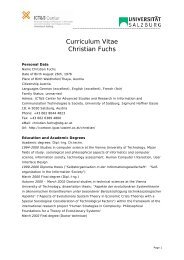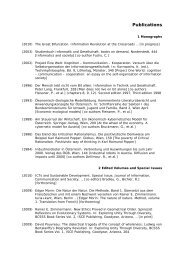ICTS AND SOCIETY: THE SALZBURG APPROACH - ICT&S
ICTS AND SOCIETY: THE SALZBURG APPROACH - ICT&S
ICTS AND SOCIETY: THE SALZBURG APPROACH - ICT&S
Create successful ePaper yourself
Turn your PDF publications into a flip-book with our unique Google optimized e-Paper software.
ICTs and Society: The Salzburg Approach<br />
Conceptualisations which date from the second half of the 1980s mark a new period<br />
in which the interrelations and interconnectedness of these two lineages came<br />
to the front. These are:<br />
• the hypothesis of the control revolution by which James R. Beniger (1986)<br />
draws parallels between the breakthrough to the Information Society and<br />
former revolutions in the course of life and culture; and<br />
• the hypothesis of the evolution of information-processing systems put forward<br />
by Klaus Haefner in 1988 (and edited in 1992b, see also 1992a)<br />
which makes the Information Society the ultimate result of the evolution of<br />
systems in the universe which are capable of generating and processing<br />
ever higher information.<br />
These two outstanding contributions are the initial steps towards a single and comprehensive<br />
science of – that is, for, about and by means of – the Information Society.<br />
Writings of scholars who do not have a sociological but rather a cross-disciplinary<br />
background build upon the same train of thought: the three-volume work of the<br />
Dutch expert in International Relations, Johan K. De Vree (1990), who develops a<br />
system-theoretical approach, starting with thermodynamical considerations, and by<br />
doing so avoids the fundamental shortcoming of cutting society free from the<br />
material-energetic world (a mistake which Luhmann makes), has to be mentioned<br />
here, as well as the information-science trilogy written by Tom Stonier (1990, 1992,<br />
1995), a biologist and, finally, before he passed way, Professor Emeritus for science<br />
and society at the University of Bradford, who offers an evolutionary perspective of<br />
societal development up to the information age. Both of them had been active in<br />
the Foundations of Information Science community when it started a decade ago. In<br />
addition there are several approaches which aim at theories of a global brain (e.g.<br />
the Principia Cybernetica Project group around Francis Heylighen, see for instance<br />
1995 or 1997, from a cybernetics point of view) or a collective intelligence (Lévy<br />
1997 – in French 1994 –, from a philosophical point of view) or draw parallels<br />
between super-organisms and mankind (Stock 1993) or between biotic and cultural<br />
developments in general (see e.g. the living systems theory of James Grier Miller<br />
from 1978 and the article Miller and Miller 1992 or Peter Corning's Synergism<br />
Hypothesis from 1983) or share an evolutionary perspective without referring to<br />
biology (e.g. Malaska 1991, Artigiani 1991).<br />
Hofkirchner | Fuchs | Raffl | Schafranek | Sandoval | Bichler 18









